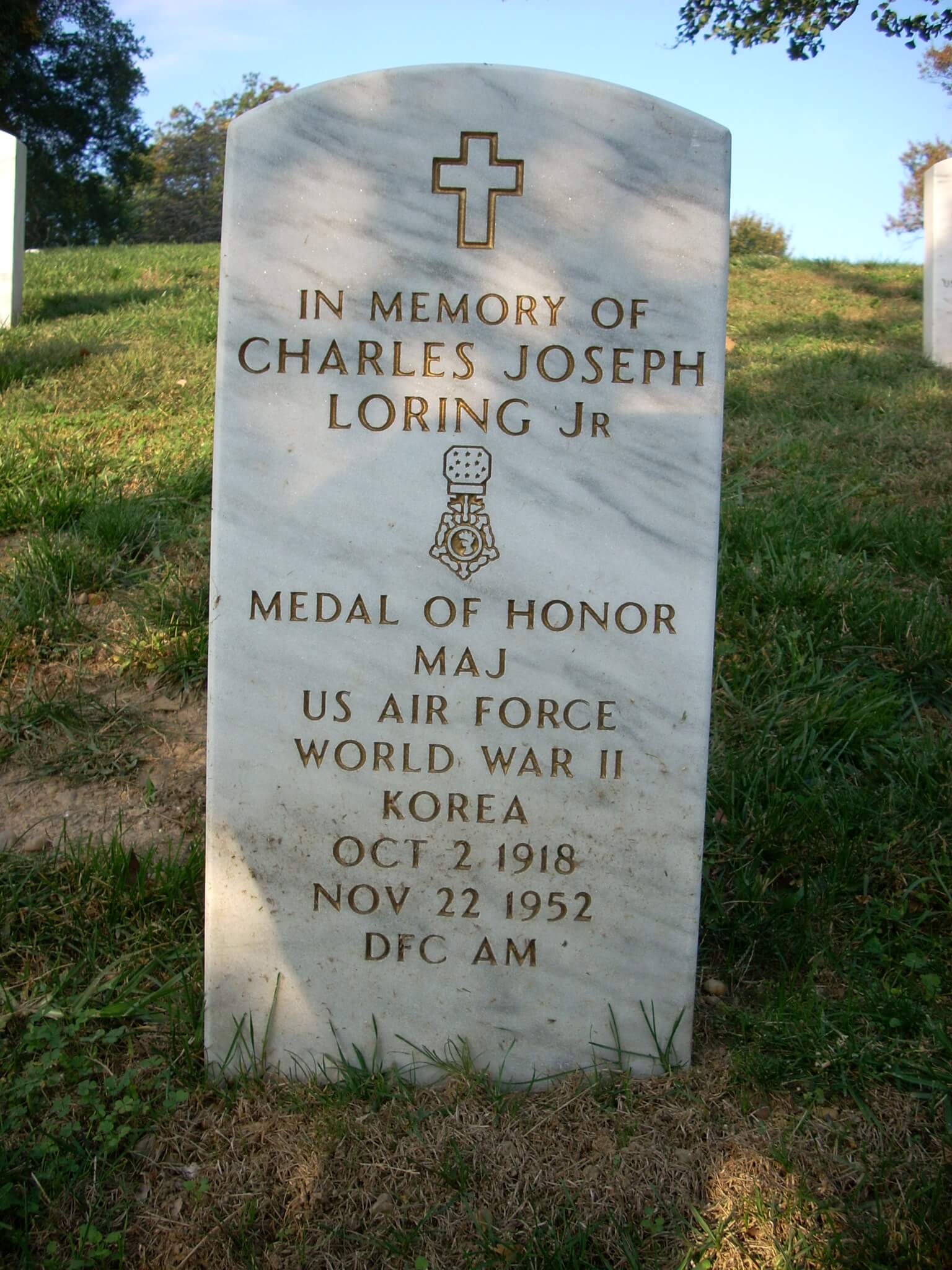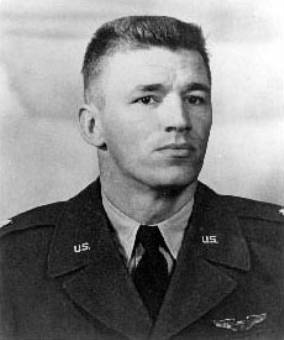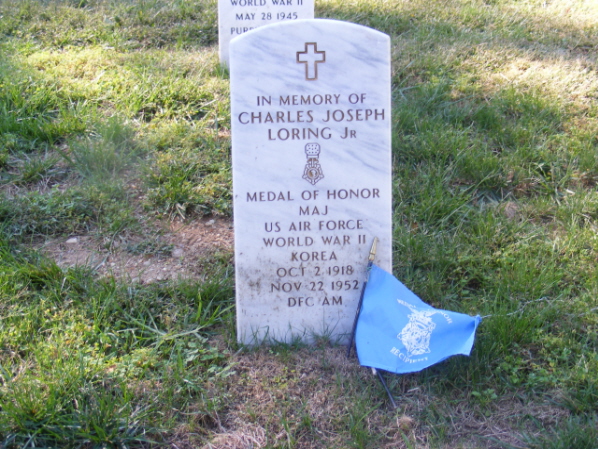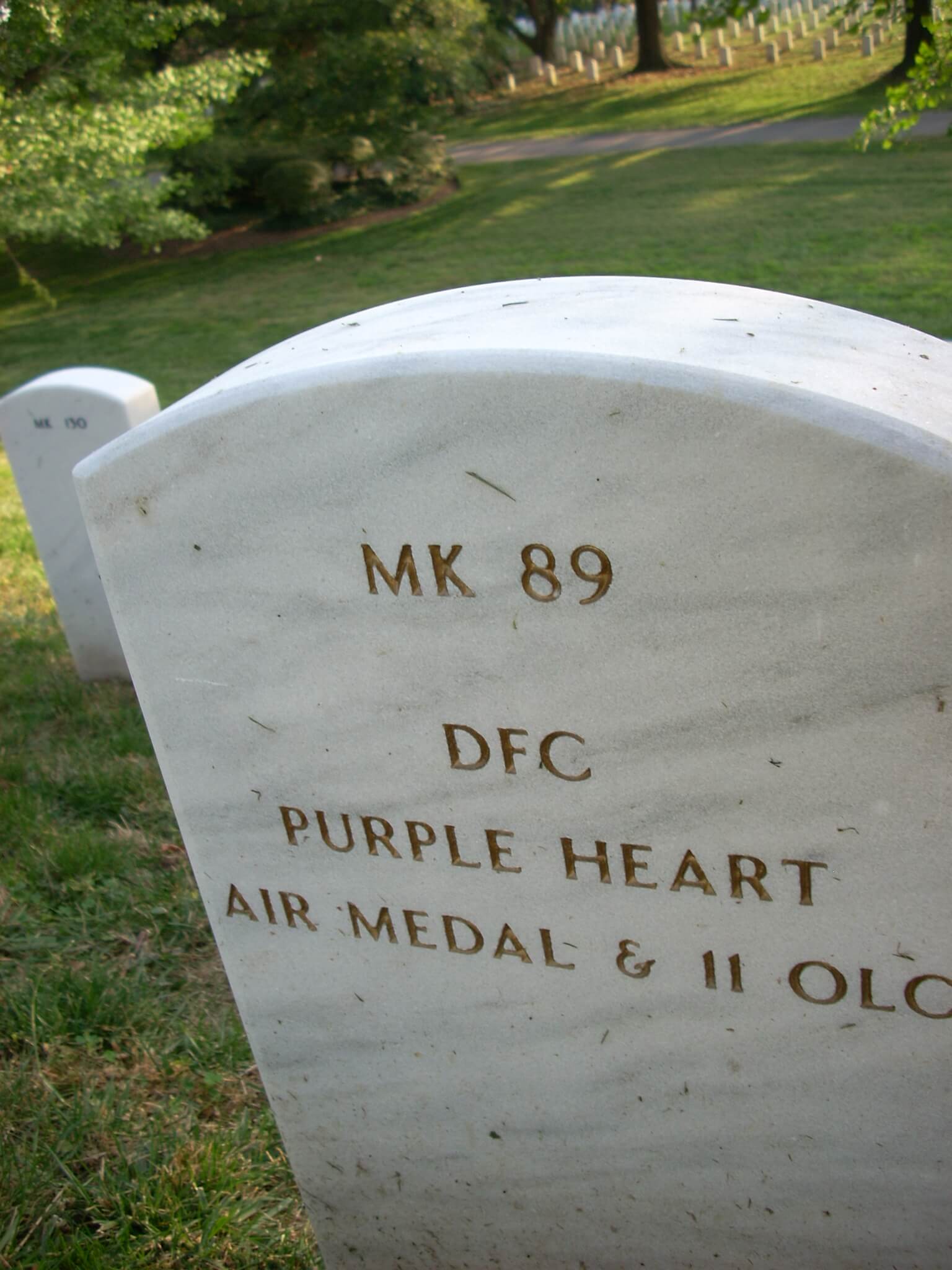Courtesy of the United States Air Force:
Major Charles Joseph Loring Jr. went to Europe in 1944 as a fighter pilot with the 36th Fighter Group’s 22nd Squadron. He completed 55 combat missions before he was shot down and made a prisoner of war. He went to Korea in May of 1952 with the 36th and 80th Squadrons, 8th Fighter Bomber Group.
During a close air support mission on November 22, 1952, Major Loring’s flight was dive-bombing enemy gun positions. He was hit repeatedly by ground fire during his dive. Instead of withdrawing, Major Loring aimed his F-80 directly at the gun positions and deliberately crashed into them, destroying them upon impact. Loring Air Force Base, Maine, was subsequently named in his honor.
Medal of Honor Citation:
Major Charles J. Loring, Jr., United States Air Force, a member of the 80th Fighter-Bomber Squadron, 8th Fighter-Bomber Wing, distinguished himself by conspicuous gallantry and intrepidity at the risk of his life above and beyond the call of duty near Sniper Ridge, North Korea on 22 November 1952.
While leading a flight of four F-80 type aircraft on a close-support mission, Major Loring was briefed by a controller to dive-bomb enemy gun positions which were harassing friendly ground troops.
After verifying the location of the target, Major Loring rolled into his dive bomb run. Throughout the run, extremely accurate ground fire was directed on his aircraft. Disregarding the accuracy and intensity of the ground fire, Major Loring aggressively continued to press the attack until his aircraft was hit. At approximately 4,000 feet, he deliberately altered his course and aimed his diving aircraft at active gun emplacements concentrated on a ridge northwest of the briefed target, turned his aircraft 45 degrees to the left, pulled up in a deliberate, controlled maneuver, and elected to sacrifice his life by diving his aircraft directly into the midst of the enemy emplacements.
His selfless and heroic action completely destroyed the enemy gun emplacement and eliminated a dangerous threat to United Nations ground forces. Major Loring’s noble spirit, superlative courage, and conspicuous self-sacrifice in inflicting maximum damage on the enemy exemplified valor of the highest degree and his actions were in keeping with the finest traditions of the U.S. Air Force.
Charles Loring, one of four airmen to receive the Medal of Honor for combat in Korea, attended high school in his hometown, where he enlisted March 16, 1942. In May he became an aviation cadet, training at Douglas Field, California; Greenville, Mississippi and Napier Field, Alabama. He was commissioned as a pilot in December 1942.
Loring served at Maxwell Field, Alabama; Puerto Rico; and Charleston, South Carolina, before going to Europe in March 1944, with the 36th Fighter Group’s 22nd Squadron. He began the first of 55 combat missions and was promoted to first lieutenant that June.
On December 24, 1944, his plane was hit on a strafing mission and went down over Belgium. He was taken prisoner until war’s end and returned to the United States in June 1945. He was promoted to Captain in October He held staff assignments at Victoria and Foster Fields, Texas. Between 1946 and 1949, he attended the following schools: Army Exchange at Fort Oglethorpe, California; Adjutant General’s and Army Information, at Carlisle Barracks, Pennsylvania; and Air Tactical at Tyndall AFB, Florida. He taught at the Information School for two years and in May 1952, went to Korea with the 8th Fighter Bomber Group.
Loring helped train replacement jet pilots and served as pilot and squadron operations officer for the 36th and 80th Squadrons. He also flew combat missions and was killed in action November 22, 1952, while leading a flight of four F-80 jets on a close support mission near Sniper Ridge in North Korea. The mission was to dive-bomb enemy gun positions which were harassing friendly ground troops. Loring’s plane was hit by ground fire as he verified the gun positions and rolled into his dive-bomb run. Hit again and again as he pressed the attack, he deliberately altered his course and aimed his diving aircraft at the active gun emplacements.
The Medal of Honor reads, in part: “…With infinite personal courage and daring, Major Loring elected this sacrifice turning approximately 45 degrees to the left and pulling up slightly in a deliberate, controlled maneuver which carried his aircraft directly into the midst of the gun emplacements, destroying them completely. Maj. Loring’s superlative gallantry and valor far beyond the normal call of duty were in keeping with the highest traditions of the military service, and reflected .great credit upon himself, the Far East Air Forces, and the United States Air Force.”
Charles Loring had been promoted to Major only two months before his death. Besides the nation’s highest award, he also earned the Distinguished Flying Cross and 12 Air Medals in combat in two wars.
LORING, CHARLES JOSEPH JR
- MAJ US AIR FORCE
- WORLD WAR II, KOREA
- DATE OF BIRTH: 10/02/1918
- DATE OF DEATH: 11/22/1952
- BURIED AT: SECTION MK SITE 89
- ARLINGTON NATIONAL CEMETERY

Michael Robert Patterson was born in Arlington and is the son of a former officer of the US Army. So it was no wonder that sooner or later his interests drew him to American history and especially to American military history. Many of his articles can be found on renowned portals like the New York Times, Washingtonpost or Wikipedia.
Reviewed by: Michael Howard



